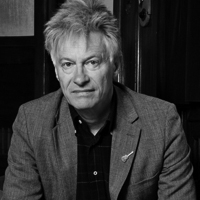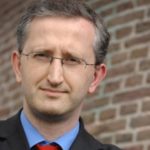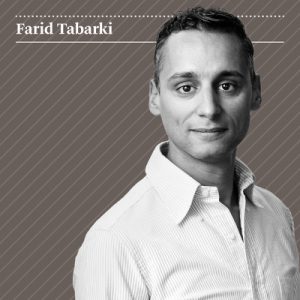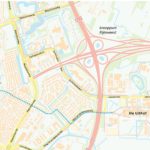On Friendship / (Collateral Damage) II – The Guardians of the Door ~ Summary
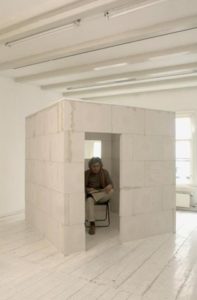
Joseph Semah – MaKOM The doubling of the House 1979 – 2017 cellenbetonblokken 200 x 200 x 200 cm Photo: Ilya Rabinovich
Artist Joseph Sassoon Semah (1948) was born in Bagdad, where his grandfather Hacham Sassoon Kadoori (1885-1971) was Chief Rabbi of the Babylonian Jews. In 1950 he was ‘relocated’ with his parents to the State of Israel. In the mid-70’s Semah decided to leave Israel, speaking in this context of his self-chosen exile. He lived and worked in London, Berlin and Paris; but has been settled in Amsterdam since 1981, where he has positioned himself as ‘the Guest’. By reading in his native language, Hebrew, he has detected a shortage of Jewish awareness. Jewish significance receives too little attention in western history of art and Semah feels the urgent need to append this and to fill the ’empty page’.
During his long-term project On Friendship / (Collateral Damage) in which he collaborates with Metropool International Art Projects / Studio Meritis MaKOM (Linda Bouws), the main question is how western art and culture are presented and why. In Part 1 (2015) Semah searches for the specific Jewish implications in Kazimir Malevich’s The Black Square and Barnett Newman’s work, and also critically researches the claim by a growing group of people that refer to the Jewish-Christian origin of European culture.
Through his lawyer Bob Vink, Semah makes contact with Beatrix Ruf, director of the Stedelijk Museum Amsterdam and asks her to account for the ’empty page’ in art history on behalf of the art world.
In On Friendship / (Collateral Damage) II – The Guardians of the Door, Luther and 500 years of Reformation are the central subject: with art, performances, artistic interventions, round-table conversations, lectures and a book publication. There will be critical reflection on the image of Luther as a ‘superstar’ and on his importance then and now. The Nieuwe Kerk, The Joods Historisch Museum, the Stedelijk Museum and the Goethe-Institut are all partners in this project.
The starting point was Semah nailing his answer to Luther on the door of the Nieuwe Kerk, preceded by a ‘procession’ coming from the Dam square.
The Answer is this:
And in the background we still see the unsolvable dilemma of the Guest. On the one hand he is forced to be silent about his highly personal way of reading, while on the oter hand he uses Christian tactics to be noticed without being discovered.
The Guest in ourselves is primarily an artist with words, for words form the way he has learned to conceal his name, hide his doubt and suppress his fear by publicly criticising his wish to participate within the western paradigm. Please note, the nostalgia for a lost paradise, will pursue the Guest from the start and during his whole active life in exile.
Signed by JOSEPH SASSOON SEMAH
JOSEPH SASSOON SEMAH
After this intervention at the church-door there was a round-table conversation about Luther’s influence on the arts. From every angle that one looks at Luther’s influence, we must acknowledge the background of the speakers: christianity, judaism and art world.
Irene Zwiep, professor of Hebrew and Jewish studies at the University of Amsterdam, entered the discussion on the influence Luther’s Reformation had had on Judaism.
“The basic thought is that ‘a’ Judaism does not exist. It has by definition always been a many-voiced matter, within which dissidents could voice their different opinions. For that reason a reformation, meaning a radical restructuring, was unnecessary. ‘Chiddush’ (renewal) was for centuries synonymous to ‘massoret’ (tradition). Until, according to Zwiep, in 1820 a group of young Jews from Berlin decided to implement Luther’s Reformation nonetheless. Because of their interference ‘massoret’ became history and ‘chiddus’ judaism.
On the 13th of July 2017, Joseph Semah pursued the case with a public intervention/installation in the Nieuwe Kerk, observed by a large audience. At the end of the performance the audience is invited to fasten the 5000 meter of long threads to the table. They are finally pinned down with a boiled egg (95 in all, in reference to Luther’s 95 theses), leaving a fan shape of threads on the church floor.
In the Joods Historisch Museum there will be a a special selection of Semah’s work on show, from the 5th of October 2017 until the 7th of January 2018. An exhibition directly reflecting upon On Friendship / (Collateral Damage) II – The Guardians of the Door.
On the 20th, 21st and 22nd of October the conversation continued with the Stedelijk Museum Amsterdam, including a round-table session, the presentation of the book publication On Friendship / (Collateral Damage) II – The Guardians of the Door, five unique performances by Joseph Semah and a three-day reading session in a specially constructed MaKOM house made of concrete blocks set at the entrance, in which Semah will read from selected texts of his 30-year research into the ’empty page’.
This way the Stedelijk Museum agrees to the question of our times that a museum must be more than just a place of presentation, but also a place where different interpretations and visions on art can be fully appreciated.
Visions formulated in the book by Egbert Dommering, Maarten Doorman, Arie Hartog, Paul Mosterd, Margriet Schavemaker, Emile Schrijver, Rick
Vercauteren, Felix Villanueva en Jan Voss, and including texts by Joseph Semah en Linda Bouws.
At the Goethe-Institut (9th of November) there will be a meeting with Arie Hartog, director of the Gerhard-Marcks Haus in Bremen and five pieces of art by Semah will be exhibited.
We thank everyone who has collaborated on On Friendship / (Collateral Damage) II – The Guardians of the Door, and made it possible for us to realize this project.
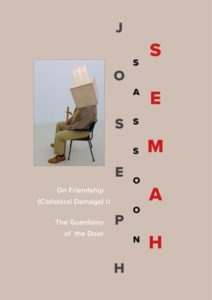 Publicatie
Publicatie
Linda Bouws & Joseph Semah (red.) – On Friendship / (Collateral Damage) II – The Guardians of the Door
Reflectie vanuit de kunst en cultuur op 500 jaar reformatie en Maarten Luther, met en rond Joseph Sassoon Semah.
Auteurs:
Joseph Semah – Pretext en The Guardians of the Door: how to explain hare hunting to a dead German artist
Emile Schrijver – Flarden van associaties: een soort brief aan een vriend
Arie Hartog – Over het onderzoek van Joseph Semah: begrijpen wie aan tafel zit
Paul Mosterd – In situ: kunstenaar en kerk
Linda Bouws – Wanneer kunst religie raakt
Egbert Dommering – Luther, Reuchlin en Joseph Semah
Jan Voss – “That’s too bad even for an ice cream parlour”
Maarten Doorman Luther als open zenuw van de Duitse geschiedenis
Felix Villanueva – Todnauberg (Re)Visited. Over de ontmoeting tussen de dichter en denker
Rick Vercauteren – Next Year in Jerusalem
Margriet Schavemaker – Dwingende voetnoten: Joseph Semah en het Stedelijk Museum<
Te bestellen via: Stichting Metropool Internationale Kunstprojecten, 35 € + 5 € verzendkosten, rek.nr. INGB 0006928168 o.v.v. “On Friendship”, naam en adres
Truth Or Dare? A Plea For Moderation
Philosophers who play the game ‘truth or dare’ are bound to recall the celebrated motto sapere aude (dare to know, dare to seek the truth) which Immanuel Kant used to capture the essence of the Enlightenment. In his famous essay from 1784, he called upon mankind to release itself from its self-inflicted immaturity in thoughtlessly accepting the authority of tradition and the tutelage of others, by wielding the force of critical reason. Self-emancipation through free public reasoning, however, required an act of personal courage, of daring to speak ‘truth to tradition’ and ‘truth to power’: of using knowledge, evidence, science and facts in challenging the powers that be.
But in our so-called post-truth society, Kant’s motto has been dramatically turned inside out, stood on its head, become perverse and cynical. The courage to speak out, to speak the truth, to break taboos, has become a major hallmark of a dominant anti-intellectual and populist Zeitgeist. Rightwing leaders such as Jörg Haider, Filip de Winter, Pim Fortuyn and Marine le Pen have all brandished the slogan: ‘We say what you think (but do not dare say)’. Mut zur Wahrheit is a poster tekst widely used by the Alternative für Deutschland. Donald Trump’s followers particularly like him because he dares to ‘speak his mind’.
According to this upside down version of the ‘courage of reason’, true speaking is transformed into a simple act of daring: of speaking without moderation, without thinking twice, as a raw expression of resentment, anger and frustration, and indulging in extremism, provocation, brutality and abuse. The courage of reason turnes into the courage of the bully.
Alt-right writer Milo Yiannopoulos explains: ‘Extreme ideas are permitted and even desirable. Anything goes. Rebellion, raising hell and incivility once again become acceptable in public life’. It is the by-now- familiar style of Breitbart, Fox News and Donald Trump, as pioneered in the Netherlands by GeenStijl, PowNews en De Dagelijkse Standaard. All of them seem to have adopted rule #1 of populist propaganda as formulated in Adolf Hitler’s Mein Kampf: ‘Be radical, proclaim your vision as the absolute truth’. A watered-down version of this was presented by Geert Wilders a few years ago in Milan: ‘Truth is not located somewhere in the middle. It is on our side, so you better get used to it’. Thierry Baudet, who describes himself as ‘one of the most brillant thinkers in the Netherlands’ adopts an equally peremptory tone: ‘My opinions are simply facts: I am right and the others are wrong’. Read more
Speech Truth or Dare, September 17th 2017
In preparation for this session I looked at the idea of critical citizenship. Specifically at the question of what are the preconditions for critical citizenship?
I would say there are at least three:
1. procedural: everyone playing by the same rules, and accepting the legitimacy of those rules. I’m thinking here of our constitution, and of the international charters in which our fundamental rights or liberties have been enshrined;
2. moral: everyone accepting the legitimacy of the other as an actor in that debate. Acceptance that life, liberty and the pursuit of happiness is the right of every individual. That we believe that all men and women are created equal, that we accept and respect the fundamental dignity of each individual;
3. epistemological: everyone accepts that debates may be guided by emotions and/or ideologies, but that they should be grounded in facts. Or at least
checked against them.
Is there a crisis in critical citizenship? It’s certainly being challenged on all three grounds.
To give one example: American conservative radio talkshow host Charlie Sykes recently did an interview with NPR. He told about how facts seemed to
have lost their meaning for some of his listeners. When lushing back against some crackpot conspiracy theory with facts, he was told these facts counted
for nothing because sources (NY Times, CNN etc) “had lost legitimacy”.
This is a problem: facts matter. If facts lose their meaning, there’s no basic standard to which we can appeal to assess political claims. Then any kind of
theory can be used to explain reality, even conspiracy theories — which as far as I’m concerned is the lowest form of sociology.
So facts matter. As does morality. It really is a problem if a politician treats whole groups of citizens as a suspect class, and tries to strip them of their
fundamental rights (wanting to outlaw an entire religion). Or if a politician suggests all society’s ills are caused by “the elite”, suggesting those who govern the country are engaged in a deliberate secret campaign to ruin the country. Read more
Truth Or Dare ~ Mena-Region and Europe Towards A More Inclusive Dialogue
Tolhuistuin – IJpromenade 2 – 1031 KT Amsterdam ~ September 17 -2017, 14.00-21.30 h. – +31(0)20 7630650
To reserve tickets 7.50 € https://tolhuistuin.nl/agenda/
Do we citizens have a right to truth in post-truth societies? How much debate can we handle? What to do with ‘legitimacy claims’ and ‘the rule of law’ if increasingly they seem more part of the problem than being key to conflict resolution?
If you are interested in these pivotal issues of our time, come to the Tolhuistuin in Amsterdam on Sunday September 17 and participate in the Truth or Dare festival ‘beyond post-truth society’.
Truth or Dare welcomes the current battles about ‘fake news’ and ‘alternative facts’ as excellent opportunities to revisit and redesign our societies in Europe and the MENA region.
The event aims to offer a unique chance to challenge ourselves, discard useless narratives and develop new ones, and engage in fruitful dialogue with changemakers from around Europe and the Mena-region.
Truth or Dare is an exploration in five acts of the meaning of truth in present-day societies.
Taking our lead from the global debate about ‘the post-truth society’, we consider the fundamental crisis of the post truth age as a battle over legitimacy and the control over central institutions in society. Our conference is an attempt to create a safe space for critical contemplation and serious self-reflection. We deem such reflections crucial and a prerequisite in any fight for more equal and inclusive social and political dialogues. We focus our deliberations on the MENA region and Western Europe.
Prologue – 14.00-14.30 h.
Truth or Dare
Do citizens have a ‘right to truth?’ This thought-provoking speech will take us through the various meanings of ‘truth’ in our times. The speech is a prelude to an open dialogue with all participants that will address the following questions:
– Is a ‘common truth’, in this context defined as social consensus, necessary and a basic condition for peace and social stability?
– Is the discourse on truth and truth claims equally accessible to everyone?
– What are the consequences when institutions whose legitimacy derives from their ability to criticize, such as science and the rule of law, have become
contested themselves?
Keynote speaker: Adel Maïzi, Truth and Dignity Commission Tunisia
First act: Truth 14.30-15.30 h.
Is there life after truth?
Moderator: Markha Valenta, assistant professor at Radboud University Nijmegen
How are truth claims played out in present day societies and what are the minimum conditions needed to build (or rebuild) democratic institutions? These will be the two key subjects of this first Act. Modern institutions which arose from out of the need to hold societies together, such as media, science, the democratic rule of law and other forms of government derive their legitimacy from their ability to accommodate divergent ideologies and views: through systems of rules, procedures and standards they are supposed to build on a social consensus about values and methods. Now that this implicit agreement is undermined and considered of diminishing value, the question arises: What are the minimum conditions needed to build or rebuild well- functioning (democratic) institutions? Is ‘social consensus’ a basic condition to prevent polarization and social conflicts or does it suffice to just establish a set of transparent mechanisms to deal with diversity?
Speakers: Jonas Staal, Dutch visual artist; Samir Makdisi, American University of Beirut Read more
Truth or Dare: Tunisia’s case ~ Keynote Speech Adel Maïzi
With a keynote speech of Adel Maïzi from Tunisia’s Truth and Dignity commission, that touches on the painful processes of ‘truth telling’ and paves the way beyond the post-truth society.
Tunisia’s case
Those who in the current post- truth era wish to undertake a serious attempt to go beyond ‘the post-truth society’ and would like to revisit and redesign societies in Europe and the MENA region can’t ignore ‘the case of Tunisia’.
After a history of colonialism and dictatorships, in which ‘truth’ functioned as political instrument, control tool, construct of power or strategy to survive, the country is desperately seeking for ‘ the truth’ about its history and searching for a certain consensus about basic social and political values.
The deep wounds and scars of Tunisia’s post (or ‘before’?) – truth era are very present in today’s society.
Deep distrust, historically grown, among citizens, between citizens and political parties and toward state’s institutions represent the biggest obstacle to social pacification.
In 2014, Tunisia launched a Truth and Dignity commission, inspired by south- Africa amongst others, to uncover the truth of human rights abuses, preserve the memory for the nation and help reform the system.
Now that the mandate of the commission is nearing its end, it’s possible to take stock and see what has been achieved. In a series of hearings, the commission has opened a Pandora’s box of testimonies of victims of cruelty, torture, violence and rape. The first hearings were viewed by about a third of the population and gave rise to debate and concern in and outside the country. The testimony of the victims has shredded long-accepted official narratives and has exposed serious human right violations by the Tunisian authorities, human rights violations by authorities is still taboo in large parts of the world.
The first sings that the truth-telling is changing attitudes and opening a path to reconciliation have presented themselves.
Yet, the question whether the commission will fulfil her purpose remains open.
Tunisia’s Truth and Dignity has, so far, not been able to unshackling itself from the damaging divisions that have been characterising the country for decades. Politicians and media commentators rushed to criticize the hearings and undermine the work of the commission.
Officials who worked for the previous governments complained that the hearings are one -sided while citizens accused the commission of partiality and political motivations.
Why is the commission only focusing on RCD, the ruling party since 1956 and does Ennahda, the Islamist party who won the 2011 elections, remain unaffected? Who is responsible for the series of destabilizing terrorist attacks in the first years after the uprisings?
Is it really necessary to dig deeper and wouldn’t be better to turn the page?
If nothing else, Tunisia’s Truth and Dignity Commission has opened the debate about the significance of Truth in present day’s societies. Can societies do without a truth? Do citizens have a right to truth and what’s needed for more equal and inclusive working institutions?
It’s Just Not Relevant ~ Objective Truth
In 2015 Oxford Dictionaries chose the laughing face called ‘face with tears of joy’ (an emoji or ‘ideogram’ in internet communication) as its word of the year. The dictionary was not as upbeat this time around. The winner of 2016, ‘post-truth’, according to its definition relates to or denotes “circumstances in which objective facts are less influential in shaping public opinion than appeals to emotion and personal belief”. Doesn’t that call to mind Brexit and the US elections?
We are not talking here about a novel phenomenon. The Nation reminds us that the term ‘post-truth’ appeared in the magazine as early as 1992. Back then, Serbian-American author Steve Tesich was referring to the Iran-Contra affair of 1986, during which president of the US Reagan denied selling weapons to Iran in order to finance the Nicaraguan Contras.
According to Tesich “in a very fundamental way we, as a free people, have freely decided that we want to live in some post-truth world.“
Since then, Clinton has claimed not to have had sexual relations with that woman, Tony Blair has justified the war against Iraq by lying about Iraq’s supposed possession of weapons of mass destruction, and president Trump has denied climate change. It is not so much that objective truth does not exist, as indeed the postmodernists claim, because it does: it’s just not relevant.
You might expect such an absurd situation to occur only in unfree countries, such as the fictional country from George Orwell’s 1984, where citizens are forced to accept two truths through ‘double-think’. Or the Soviet Union, where, according to Alexei Yurchak, associate professor at Berkeley, hypernormalization was the norm: everyone was aware of the system’s failure, but for lack of a more hopeful outlook, both apparatchiks and citizens collectively pretended it was working normally. This period gave us the following proverb: “We pretend to work, and they pretend to pay us”.
Is the free west heading for a similar mock democracy, where the lying leader pretends to be right and the citizen pretends to vote for the politician he or she really wants? In this modern form of hypernormalization, Trump’s or Farage’s lies don’t serve to conceal the truth, but rather to strengthen prejudices.
The Netherlands also doesn’t seem to be able to combat lying politicians through fact-checking. According to professor Paul Frissen we must look for new political stories, all about “solidarity in a historically grounded future”. He is right: we are lacking in imagination. You don’t dismantle lies with facts, you dismantle them with vision.
Farid Tabarki is the founding director of Studio Zeitgeist
